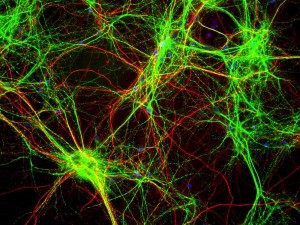FRIDAY, 25 OCTOBER 2013
A recent study lead by Prof. Giovanna Malluci in Leicester’s MRC Toxicology Unit has showed very promising results on mice which may be an historical “turning point” for neurodegenerative treatment research.Neurodegenerative diseases are characterized by the death of brain cells that are necessary for decision making, memory and movements control. This neurodegeneration is mainly due to the accumulation of misfolded proteins called amyloids which over-activate natural defence mechanisms. The overactivation of the brain’s protective system halts the production of beneficial proteins, causing brain cell death and eventually cognitive impairments.
The study focused on the natural defence of the brain, testing a compound which prevents faulty signaling in mice with prion disease. The new medication works by blocking an enzyme called PERK which has a major role in activation of brain defence processes. In the animal model tested, essential proteins necessary to protect the brain from cell degeneration were reestablished as well as cognitive impairments.
Although the mice models focus on prion disease rather than Alzheimer’s (AD),there is evidence that same mechanism might apply to both diseases and scientists are hoping that the compound might provide a valuable progress in the treatment research in AD.
The mouse model study is therefore convincing, but it may take decades to apply the findings to clinical trials. In fact, the compound tested resulted in major side effects, necessitating the development of a safer molecule for the potential treatment of AD.
Overall, this is a first compound targeting this defence pathway, and although the treatment of AD in humans is not around the corner, this study is still a major landmark opening new ideas for potential treatments.
DOI: 10.1126/scitranslmed.3006767
Written by Laetitia Schwab.

